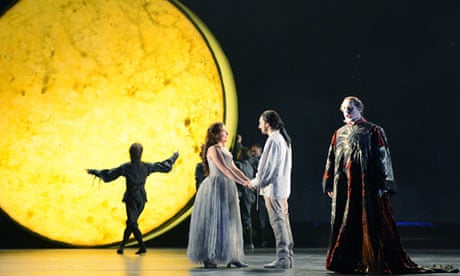The Royal Opera's latest revival of David McVicar's production of Mozart's Die Zauberflöte is dedicated to Colin Davis, who conducted it when it was new in 2003. Davis has stated that Mozart's music is "life itself", and his interpretation lingers in the memory for its nobility and its sense of the transcendental lurking within what was, after all, originally conceived as a popular entertainment with a fantastic plot.
Conducted by Julia Jones, the revival takes a very different approach and offers us a less stable experience. Jones's speeds are swift and energetic. There are genuine frissons of alarm in the whirling strings that indicate Tamino's terror at the start, and later on, a real sense of victory in trumpets and drums when trials are faced and overcome. Just occasionally, however, you wish that Jones would take the pressure off. While this is an exciting Zauberflöte, it's also notably short of sublime moments.
The singing is also of inconsistent quality. At the centre are strong performances by Charles Castronovo as Tamino and Christopher Maltman as Papageno. Castronovo is the impatient idealist, his voice leaping into the stratospheres with athletic ease. Maltman, vaulting gleefully into bed with Susana Gaspar's Papagena at the end, is funny, sad, sexy and one of the best Papagenos you will ever hear.
Elsewhere, however, things are more uneven. Ekaterina Siurina's Pamina sounds good but is more stroppy teenager than royal rebel. Albina Shagimuratova's show-stealing Queen of the Night is electrifyingly accurate, though Brindley Sherratt 's gritty-sounding Sarastro may not be to everyone's taste.
Revived by Leah Hausman, McVicar's production has looked better, too. Someone should have got rid of the crinkles in the backcloths. The routines, particularly those for the Queen of the Night's Ladies, could be more slick. The broader picture remains, though, with all its strengths and weaknesses. John Macfarlane's oppressive sets remind us that rationalism can be limiting as well as enlightening. Sarastro's brotherhood, a parade of philosophers dating from the Renaissance to the 18th century, are the male guardians of western consciousness from which women have all too frequently been excluded. The decision not to tackle the opera's racist undertow, however, and to rewrite the libretto to omit all reference to the fact that Monostatos is meant to be black, remains a mistake.

Comments (…)
Sign in or create your Guardian account to join the discussion